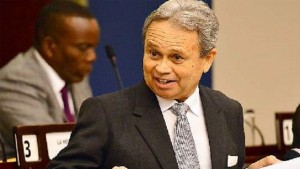
MINISTER OF FINANCE COLM IMBERT
PORT OF SPAIN, Trinidad, Tuesday October 6, 2015 – Trinidadians will be paying less Value Added Tax (VAT) and personal income tax, but are now shelling out more for gas and will also be required to pay increased National Insurance contributions.
Those were among the tax measures contained in the TT$63 billion (US$9.9 billion) budget delivered by Minister of Finance Colm Imbert yesterday, just shy of a month after the People’s National Movement (PNM) took over government from the People’s Partnership following the September 7 general elections.
But Opposition Leader Kamla Persad-Bissessar had described the budget as “anti-people” and “half a budget”.
Imbert told Parliament, in his presentation, that: the VAT rate will move from 15 per cent to 12.5 per cent, although VAT exemptions and zero-rated items would be reviewed; personal income tax exemption limits move from TT$60,000 (US$9,463) to TT$72,000 (US$11,356) from January 2016, exempting people working for TT$6,000 (US$946) or less every month from paying tax and filing tax returns.
Additionally, the cap on joint incomes received by retirees regarding NIS and old age pension will be TT$5,000 (US$788), giving recipients an additional TT$500 (US$78.80) monthly, effective December 1; and a retirees benefits programme will provide free drivers’ permits and passports for those 60 and over from January, while discounts on utility bills for other categories of retirees will be introduced later.
From January 1, 2016, farmers will also be exempted from duties and taxes.
On the flip side, NIS contribution rates will be increased from 12.0 per cent to 13.2 per cent effective July 4, 2016; the price of gas and diesel goes up by 15 per cent, reducing the country’s annual fuel subsidy by TT$340 million (US$53.6 million); and, after a five-year hiatus, property tax returns on January 1 next year, using old levels and rates as a starting point.
The biggest chunk of the 2015-2016 budget has gone to national security – TT$10.8 billion (US$1.7 billion).
Prime Minister Dr. Keith Rowley explained to reporters after the budget presentation that the high allocation was made because crime was a major national concern.
“This should let the population know that crime is having a serious effect on the population,” he said. “We have to treat and roll back the cost of criminal activity in this country. Otherwise, if it continues like that, we keep funneling money away from health, education and other productive areas trying to cope with the crime of hopefully a small minority.”
In his presentation, Imbert lamented that the economy was in an even more perilous state than the new government had envisaged, as he accused the previous administration of economic mismanagement and leaving the economy “running on fumes”.
“In order to maintain its inordinate and unsustainable levels of expenditure, the previous government maxed out our overdraft at the Central Bank, taking us from a positive cash position in 2010 to a perilous situation in 2015, where we were running on fumes, dangerously close to the legal overdraft limit,” he charged.
But former prime minister Persad-Bissessar defended her government’s economic stewardship and dismissed the budget presented by Imbert.
“There is one word to describe it; it is a deceptive budget. The sting is in the tail,” she said, warning that there would be an “IMF budget” come March 2016.
